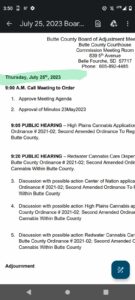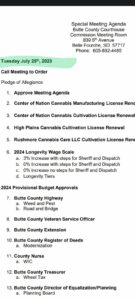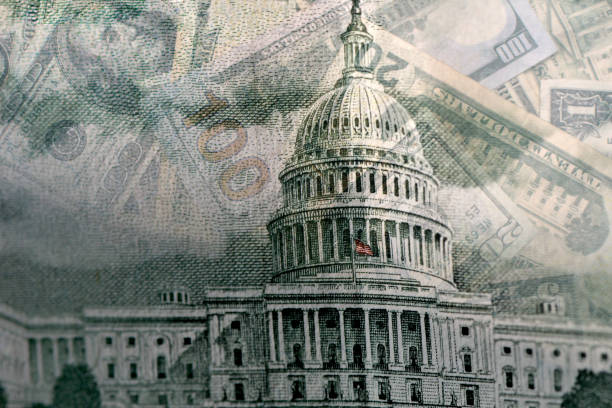On Tuesday, July 25, 2023, the Butte County Commission had two meetings in one. The first meeting was as the Board of Adjustments with the purpose of considering whether or not to grant a variance to marijuana businesses that are not in compliance with the cannabis ordinance so they can continue to operate and get their annual license renewed. The second meeting was a special county commission meeting to discuss approving provisional budgets for the county departments, among other things.
Despite the seemingly mundane government work happening during these meetings, there’s a lot happening that we’ve questioned and if the actions taken or not taken are legitimate. For comparison purposes, look at this agenda from May 2, 2023, and notice how each agenda item that directly affects and involves the public has a time listed. Also take note of this agenda from May 23, 2023, of how the commission first convened as the county commission, and then reconvened as the Board of Adjustments, and a specific time was listed for when each part of this entire meeting began. The way the times are listed for everything necessary in the meeting agenda seems to be in compliance with the state’s open meeting laws, according to what we read in the Open Meeting Laws brochure: (emphasis mine)
“SDCL 1-25-1.1 requires that all public bodies prominently post a notice and copy of the proposed agenda at the public body’s principal office. At a minimum, the proposed agenda must include the date, time, and location of the meeting and must be visible, readable, and accessible to the public for 24 continuous hours immediately preceding the meeting. Also, if the public body has its own website, the notice must be posted on the public body’s website upon dissemination of the notice. For special or rescheduled meetings, public bodies must comply with the regular meeting notice requirements as much as circumstances permit. The notice must be delivered in person, by mail, by email, or by telephone to all local news media who have asked to be notified.”
With that in mind and with the agendas from May to reference and compare to, take a look at these screenshots of the meeting agendas from July 25, 2023:


The one thing we noticed first was that the commission convened as the Board of Adjustments (BOA) first, with their special meeting following after it. With the BOA agenda, the day is incorrect, as it should’ve read Tuesday, July 25th. Then, when you look at the agenda for the special meeting, the date is correct, but no time is listed for when the meeting begins. Over the last six weeks or so, numerous meetings had to be re-scheduled due to issues with the agenda not being in compliance with open meeting laws, yet with these two incorrect agendas, they proceeded with the meetings anyway. Our questions are: were these agendas in compliance with open meetings law? If not, why did the commission proceed in having the meetings, even after attendees asked about these mistakes? While this seems to be a bit “nit-picky” to some, it’s important because this involves the public and our rights to know and attend meetings if and when we’re able, as stated here in the Open Meetings brochure:
“South Dakota’s open meetings law embodies the principle that the public is entitled to the
greatest possible information about public affairs and is intended to encourage public participation
in government. SDCL 1-25-1 requires that official meetings of public bodies must be public and
notice is to be given of such meetings 24 hours in advance of the meetings. While the open
meetings law does not define “official meeting,” specific statutes relating to cities, townships,
counties, and school districts define what constitutes an official meeting. In addition, the attorney
general takes the position that a meeting must be open to the public if:
1) A legal quorum of the public body is present at the same place at the same time; and
2) Official business, meaning any matter relating to the activities of the entity, is discussed.
Openness in government is encouraged.”
If we don’t have the correct information on agendas posted, or if agendas aren’t posted right in the first place and meetings continue anyway despite not seeming to be in compliance, how is that being in compliance with state laws and encouraging tax payers to attend meetings?
Are there consequences for such actions taken if it’s found that open meeting violations did indeed occur with these agendas not being in compliance with state law? As stated in the Open Meetings brochure, yes, there are consequences:
“Excluding the media or public from a meeting that has not been properly closed subjects the
public body or the members involved to (a) prosecution as a Class 2 misdemeanor punishable by
a maximum sentence of 30 days in jail, a $500 fine or both or (b) a reprimand by the Open
Meeting Commission (“OMC”). The same penalties apply if the agenda for the meeting is not
properly posted or other open meeting violations occur.
Also, action taken during any meeting that is not open or has not been properly noticed could, if
challenged, be declared null and void. It could even result in personal liability for members of the
governing body involved, depending upon the action taken.”
Being that part of the State’s Attorney’s job is to make sure they abide by the laws, we’re not sure why she didn’t make sure they abided by said laws but instead ignored their actions.

